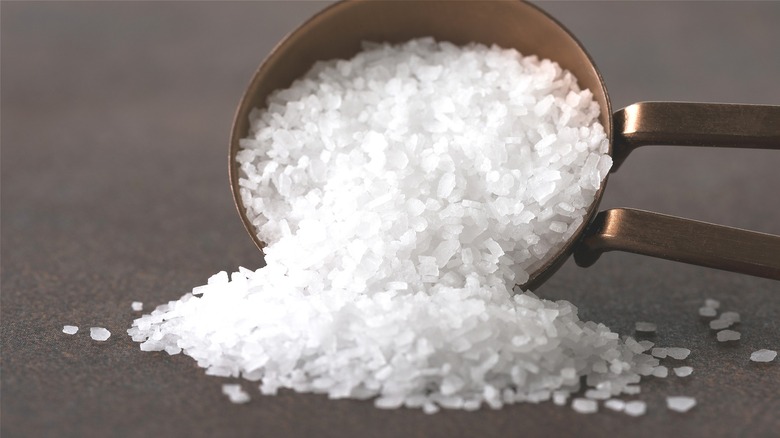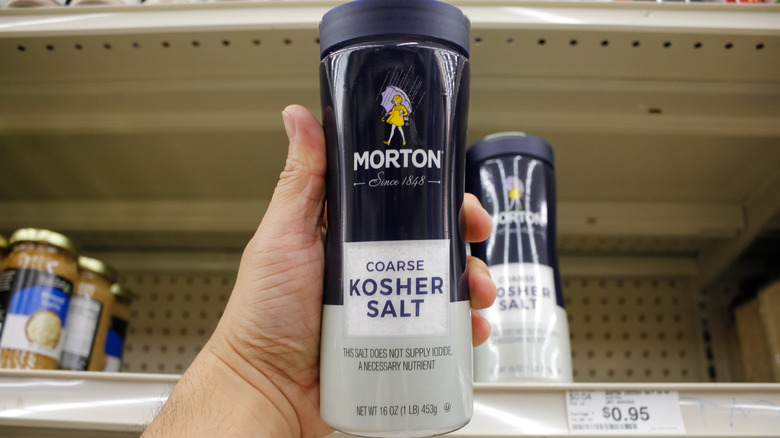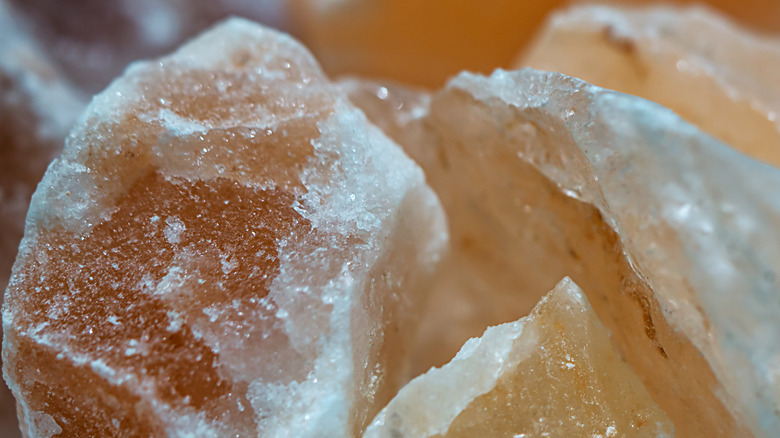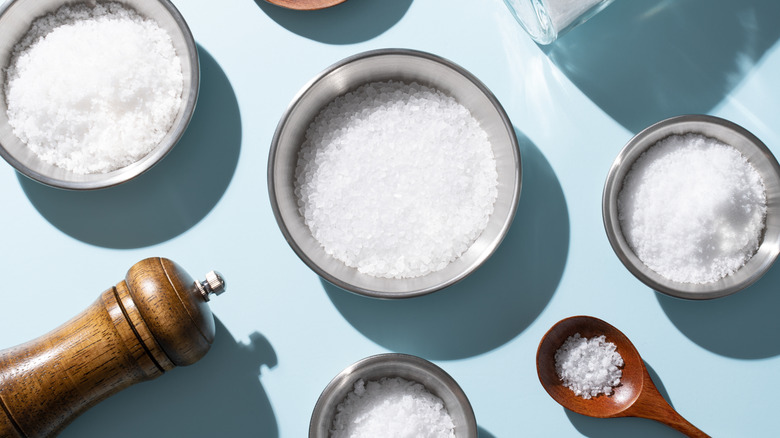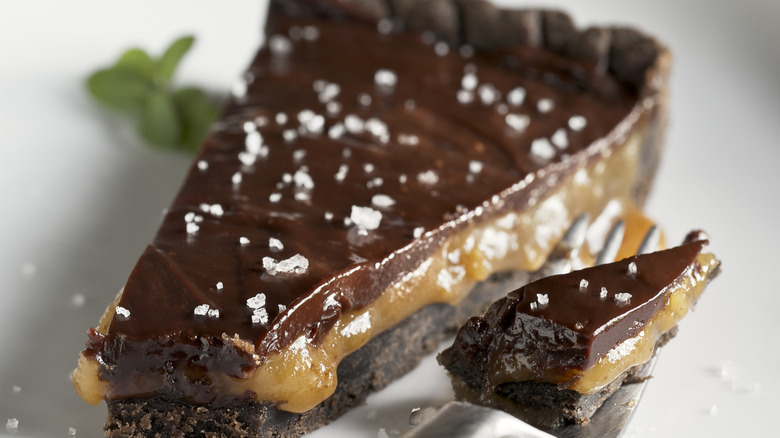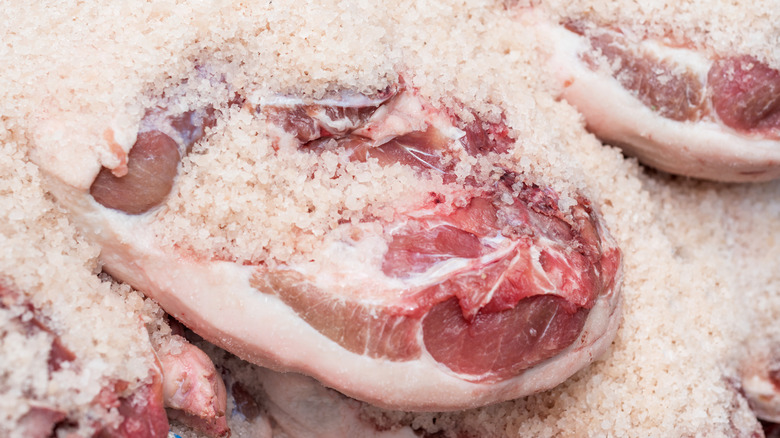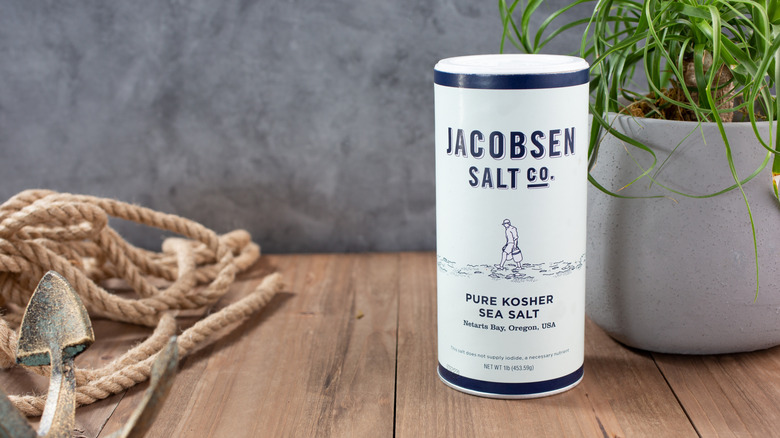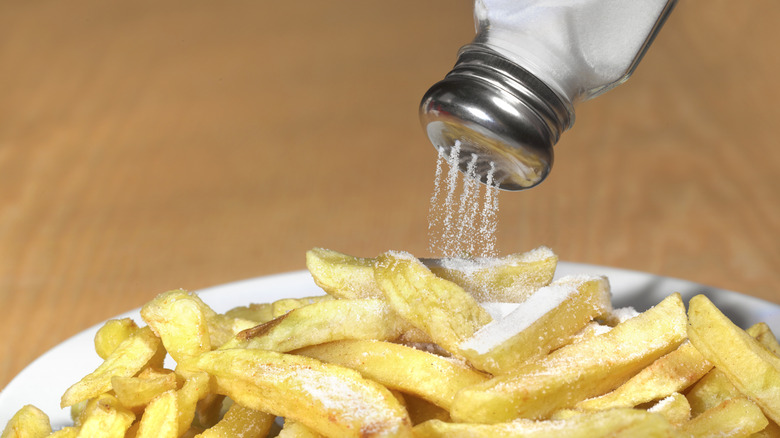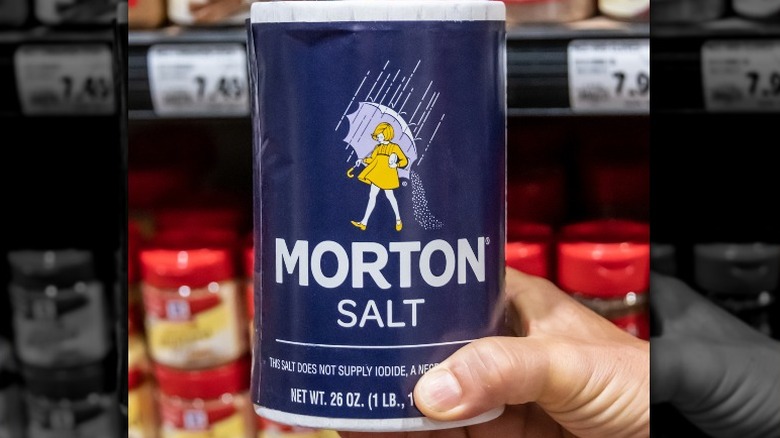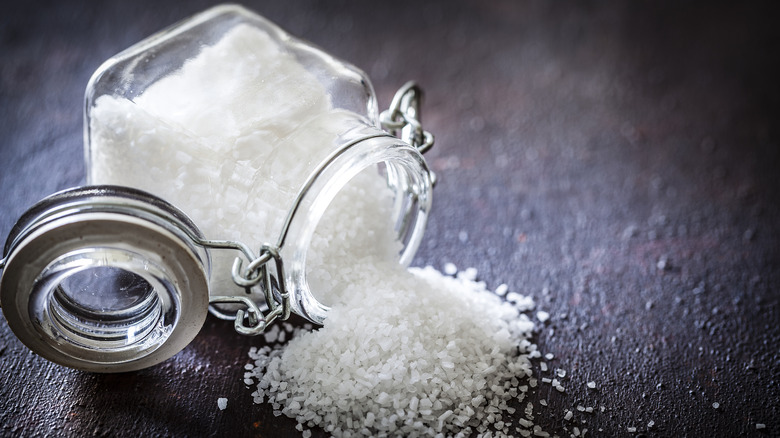What Is Kosher Salt, Anyway?
We may receive a commission on purchases made from links.
Salt is a crucial kitchen ingredient often used to enhance and balance other flavors within food. Even if you don't like to add salt to your plate, you may notice that food tastes bland or under-seasoned if you don't use salt when cooking. Salt can also draw moisture out of food, helping reduce sauces, vegetables, and meat sear. This gives you that lovely brown crust on a steak and brings out all the juicy flavors.
While fine-grain table salt is what you'll usually find in shakers or packets, coarse salts — like kosher salt and sea salt — are often preferred by chefs and home cooks. Case in point, kosher salt or rock salt is the type of salt Ina Garten uses in all her recipes, citing the seasoning's clean, mild flavor as one of her main reasons. Some recipes may also call specifically for kosher salt instead of table salt, as the latter can easily overpower more delicate flavors.
So, what exactly is kosher salt, and why is it so different from table salt? We take an in-depth look at this essential mineral to find out why kosher salt is such a famous pantry staple.
Is kosher salt actually kosher?
Despite the name, kosher salt is not necessarily kosher-certified and does not always meet official Jewish guidelines for a kosher product. This means that if your diet is strictly kosher or you're looking for kosher foods for Passover, you will still need to buy a kosher-certified salt brand. Rather than referring to kosher status, the name kosher salt comes from the fact that this type of coarse seasoning was traditionally used as part of the ancient Jewish process known as "koshering."
Salting meat helps draw blood and moisture from the protein and ties into the religious requirement that kosher Jews not consume blood — hence koshering. However, this preparation is also a common cooking technique for tenderizing meat in other cultures, as the salt begins to break down the proteins and redistributes juices on the meat's surface, giving it a more even sear when it hits the pan.
Coating meat in kosher salt can also preserve it and extend its shelf life. Meat that is salted for a long time ultimately becomes dry-cured as all the moisture is removed, preventing bacterial growth and changing the consistency to a leathery, jerky-like texture. Popular pork charcuterie, such as prosciutto and speck, are great examples of non-kosher cured products sometimes prepared with kosher salt.
How is kosher salt produced?
Like all salt, kosher salt is made up of mineral deposits from evaporated salt water. However, unlike sea salt, which is often organically extracted from seawater, kosher salt is mined from underground caves beneath salt flats. Salt pan areas and salt flats form naturally over thousands of years as solar evaporation dries up oceans and salt-water lakes, leaving a mass of briny mineral deposits behind on the ground surface and in veins inside the earth. Salt brands, such as Morton's and Diamond Crystal, mine in areas like Utah, Quebec, Canada, and South America, which are home to vast salt flats and salinated wetlands.
Mined kosher salt contains no additives or fortification chemicals, such as iodine or anti-clumping agents. Instead, kosher salt is made up purely of salt grains. This gives it a roughly even flake size and a coarse, crunchy texture, ideal for measuring out in pinches to add to food.
How is kosher salt different from table salt?
One of the main differences between kosher salt and table salt is that table salt has a stronger flavor and needs to be used more sparingly when seasoning. If you dump a whole load of table salt on your food during prep, you may notice that the result is oversalted. Don't worry, though. If you accidentally over season your meat or veggies before cooking, you can always give them a quick rinse to get rid of some brine.
Table salt is produced through rapid evaporation techniques. It has a fine texture, almost like a rough powder, which makes it great to sprinkle over prepared food or as a handy additive for processed or packaged foods. Anti-caking chemicals are added to table salt to prevent it from lumping together inside shakers, and most table salt is also fortified with iodine, which is sprayed on the salt after extraction. Although this might sound a bit sinister, iodine potassium is an important nutrient — aiding with thyroid function and blood pressure regulation — and table salt was originally iodized in the 1920s to help combat common deficiencies.
Unlike kosher salt, iodized salt has a slightly bitter aftertaste, which some people describe as faintly metallic. This puts many serious cooks off using table salt extensively in their food. In contrast, kosher salt has large, even grain sizes and contains no chemical additives.
What does kosher salt taste like?
The clean, saline flavor is one of the many reasons that chefs love kosher salt. Unlike table salt, kosher salt does not leave a bitter trace, and it is not as intensely briny, making it a good option for balancing and enhancing other flavors without overwhelming them. In this sense, it is similar to sea salt, which is great for finishing sweet foods that need an extra salty kick. For instance, leaving out a pinch of sea salt is one of the biggest mistakes to avoid when making caramel, and sea salt with dark chocolate is a divine combo.
Kosher salt also has a light, crunchy texture and a clear, white color. It dissolves quickly when added during cooking, as opposed to on the plate. If you season cooked food with whole kosher salt grains, you may find the lumps too large and the seasoning uneven. To get around this, manually grind up kosher salt with a pestle and mortar or put it in a salt grinder to refine it.
How to cook with kosher salt
Kosher salt is a great addition to stews, soups, and curries. You can add a pinch while you are browning vegetables to help pull out moisture and reduce them without burning. You can also add kosher salt when your sauce or soup is simmering to boost the flavors. It can also be added to homemade bread for a subtle, salty taste.
Coarse salt is also a great option for seasoning rice, pasta, or potato water, as its consistency makes it easy to pinch, and the flavor is great for amping up bland starches. You can add salt to the water while it's still cold or when it comes to boiling, but before you add your starch. This will give your pasta water a deliciously light and briny flavor that can be reused in other meals. Some of the most helpful uses for leftover pasta water include soaking beans and baking bread.
You can also give your meat a salt bath before cooking to dry out the skin and help it get a nice, crispy finish. To do this, you should cover your meat in salt roughly 24 hours before cooking and leave it to rest in the fridge.
Where can you buy kosher salt?
You can purchase kosher salt brands in most grocery stores. In stores such as Kroger, Costco, and Walmart, kosher salt is usually sold in cardboard packets or shakers and costs between $4-6 for a 48-ounce packet. You will generally find kosher salt in your grocery store's condiment or seasoning aisle.
Table salt is usually significantly cheaper than coarse grain salts, with a 26-ounce pack costing around $1.69 from Kroger and less than $1 from Walmart. You can also buy kosher salt online from Amazon. If you want to buy officially certified kosher salt, you may have to seek out Jewish stores or brands that specialize in kosher products. Morton's — one of the largest and most longstanding salt companies in the U.S. — sells boxes of Kosher for Passover rock salt, as does Diamond Crystal, another well-known producer of kosher salt.
Is kosher salt good for you?
In recent years, there has been a lot of buzz about the potentially dangerous effects of high-sodium diets. However, while too much salt can contribute to health issues, sodium is also crucial to a healthy diet, meaning that avoiding salt altogether can be just as problematic. Too much salt has been associated with high blood pressure and heart problems, but too little sodium can also cause problems regulating blood pressure and result in dehydration.
This means that a moderate amount of kosher salt in your diet can be beneficial, helping you flavor food and keep your sodium levels up. The grainy texture of kosher salt makes it easier to manage your portions, as you are likely to notice large, crunchy crystals on your food and less likely to add salt after cooking. In contrast, it is easy to accidentally overuse table salt, as it can be poured over cooked food in a fine powder, making it hard to gauge the quantities.
Cooking and seasoning with kosher salt is also a great way to increase your whole food intake instead of relying on processed or pre-made foods that are seasoned for you. Processed foods tend to be high in sodium — if you've ever wondered why canned soup is so salty or chips are so addictive, it's down to the high volume of added salt (among other ingredients like sugar and fat). Some people also prefer to use kosher salt because it contains no artificial preservatives.
Can you buy different types of kosher salt?
All types of kosher salt are essentially the same — mined coarse crystal salt granules free from chemical additives or preservatives. The only real difference you will find among types of kosher salt is in the various brands that sell it. Two of the most popular kosher salt brands are produced by Diamond Crystal and Morton's Salt. Diamond Crystal has been referenced as the go-to brand for many celebrity chefs, including Ina Garten and Samin Nosrat, author of the cookbook "Salt Fat Acid Heat," which has also been turned into a Netflix series.
Morton's Kosher Salt is similar to Diamond Crystal but has a slightly heavier granule. Like Diamond Crystal, it's perfect for seasoning stews and can be used to brine meat before cooking. The grainy texture of kosher salt allows it to easily stick to meat. However, Morton's kosher salt also has a stronger, saltier flavor than Diamond Crystal, so you may want to adjust the quantities and taste your food when cooking with it.
How should you store kosher salt
When storing salt loose, it is important to keep it dry and away from strong odors. If you usually buy your kosher salt in a cardboard packet or grinder, you must make sure that it is stored in a dry cupboard. Condensation in the air from steam or temperature fluctuations when cooking means that cardboard containers may get wet if left on your kitchen sideboard.
This can cause the salt inside to start to absorb moisture. When salt gets damp, it starts to dissolve and clump together, causing the crystals to lose their shape and dilute their flavor.
It's a good idea to transfer your kosher salt into an airtight container, like a glass Mason jar or a wooden salt cellar, to prevent any moisture from getting in. Salt that's stored alongside strong-smelling foods can also take on the odor, fundamentally altering its clean flavor. Keeping your salt in an airtight salt cellar will stop this from happening and allow you to keep your salt on hand in your kitchen without worrying about it absorbing cooking smells. You do not need to keep salt in the refrigerator and, properly stored, dry salt should keep indefinitely.
